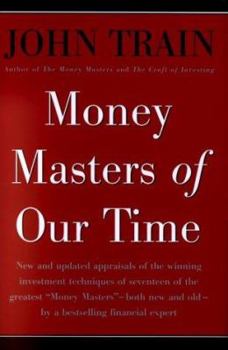Money Masters of Our Time
Select Format
Select Condition 
Book Overview
An expert reviews the experts - new and updated appraisals of the winning investment strategies of the greatest financial wizards. Money Masters of Our Time is a reappraisal and revision of those... This description may be from another edition of this product.
Format:Hardcover
Language:English
ISBN:0887307914
ISBN13:9780887307911
Release Date:January 2000
Publisher:Harper Business
Length:400 Pages
Weight:1.60 lbs.
Dimensions:1.3" x 6.1" x 9.3"
Related Subjects
Wealth Creation Business Business & Investing Economics Investing Popular EconomicsCustomer Reviews
4 ratings
If you are interested in finance then you will benefit - a lot.
Published by Thriftbooks.com User , 17 years ago
This is a wonderful book. It is highly probable that you will learn a lot from the Money Masters. I bet that you will read it more than once. If you buy it and don't like it then I will buy it from you at my average cost.
good investor interview book - inspiring
Published by Thriftbooks.com User , 17 years ago
like the Investment Gurus book in that it interviews great investors. very good food for investment thinking. boring to read though took many times to open it to finish it
Good, gossipy book of vignettes
Published by Thriftbooks.com User , 19 years ago
The people who are looking to gain valuable insight as to the workings of the market from this book are sadly mistaken. This is a book, along the lines of James Grant's book, that gives a number of vignettes and minature biographies of the leading money makers of our times, such as T. Rowe Price, Buffet, Templeton, Rainwater, Cabot, Fisher, Graham, Lightbown, Neff, Robertson, Rogers, Soros, Carret, Steinhardt, Wanger, Wilson, Lynch. You will essentially find that there is no "one" style that is successful, which lends credence to the theory that the markets are quite efficient, and some of these guys are victims of luck as well as skill. The fact that it was written in early 2000 is a plus, not a minus, as you can trace what happened to them after the crash. GOod book, the author is a bit preachy, egotistical and gossips about his subjects, but that's OK.
Up-to-Date Investment Lessons for You from the Best
Published by Thriftbooks.com User , 23 years ago
The bookshelves are full of books containing descriptions of ways to invest based on historical data and models that have not been very fully tested in practice. However, in most areas of human endeavor, a great deal is learned by studying those who are and have been the best for a long time. Money manager John Train has been playing this role for some time with his outstanding books, The Money Masters and The New Money Masters. For about two years, I have been wondering what John Train thinks about the current financial markets. I was delighted to see that he had created an updated and revised sequel to his earlier works. One of the strengths of John Train's work in this area is that he knows the people he writes about, and the chapters contain discussions he has had with them in most cases. So you get new information that you have not read before in the financial press. He also does a good job of picking a variety of styles and personality types, so you get A to Z with some letters skipped in between in these 17 profiles. These include (in order of presentation): T. Rowe Price; Warren Buffett; John Templeton; Richard Rainwater; Paul Cabot; Philip Fisher; Benjamin Graham; Mark Lightbown; John Neff; Julian Robertson; Jim Rogers; George Soros; Philip Carret; Michael Steinhardt; Ralph Wanger; Robert Wilson; and Peter Lynch. Amongst these men, you will find a variety of growth investors, value investors, those who look to undiscovered markets, intense analysts of trends and individual companies, hedge fund operators, shorts, small cap specialists, and those who focus on emerging foreign markets. It's quite a ride. Naturally, if any of them interest you, you can go further in other sources and learn more. Warren Buffett, John Templeton, Paul Cabot, Benjamin Grapham, Jim Rogers, George Soros, Robert Wilson, and Peter Lynch have always been people I have learned from, and I was glad they were included. I did not know much about Mark Lightbown and was glad to learn more. A major strength of the book is that Mr. Train goes on the sum up what it all seems to mean. He says these people validate four styles that work:"1. Buy into well-managed companies that will grow . . . . When they slow down, sell them and buy new ones.2. . . . buy stocks that are priced . . . at less than their underlying assets and sell them when they are reasonably priced.3. Discover a new investment area or one that is . . . neglected . . . .4. Identify a really good specialist to do the job for you . . . ."He has a good list of common practices that almost each of the 17 do, that you should find very helpful, as well. Finally, he talks about what you can expect for the future. He sees the reasonable returns from growth stocks to be 13-14 percent in the future (down from 20 percent in his last book). He still thinks that is a good way to go, but also counsels on when and how to use mutual funds (when they are cheap and





